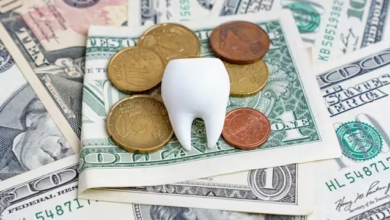SIMPLE LIFESTYLE CHANGES TO IMPROVE YOUR DENTAL HEALTH

INTRODUCTION:
Maintaining good dental health is not just about brushing and flossing—it is a combination of daily habits, diet choices, and lifestyle changes that contribute to a strong and healthy smile. Many people focus solely on oral hygiene products, but small lifestyle adjustments can have a significant impact on the condition of teeth and gums. From hydration to nutrition and stress management, there are several ways to naturally improve dental health without relying solely on dental treatments.
A proactive approach to oral care can help prevent cavities, gum disease, and other dental issues before they develop. By making simple changes in daily routines, individuals can reduce the need for costly dental procedures while maintaining a bright and confident smile. Incorporating these changes into everyday life ensures long-term oral health and promotes overall well-being.
EATING A NUTRITIOUS DIET FOR STRONGER TEETH AND GUMS:
A well-balanced diet plays a crucial role in maintaining oral health. The foods and beverages consumed daily can either strengthen teeth and gums or contribute to decay and disease. Choosing nutrient-rich foods helps provide the necessary vitamins and minerals to keep teeth strong and gums healthy.
Calcium-rich foods, such as dairy products, leafy greens, and almonds, help maintain strong enamel and prevent tooth decay. Vitamin C from citrus fruits, bell peppers, and strawberries supports gum health and reduces the risk of inflammation. On the other hand, sugary and acidic foods can erode enamel, leading to cavities and gum disease. Reducing sugar intake and choosing healthier alternatives can make a significant difference in dental health.
STAYING HYDRATED TO MAINTAIN ORAL MOISTURE AND PREVENT DRY MOUTH:
Drinking enough water is essential for overall health, but it also plays a critical role in oral hygiene. Water helps wash away food particles, bacteria, and acids that can cause tooth decay. Staying hydrated prevents dry mouth, a condition where saliva production is reduced, leading to a higher risk of cavities and gum disease.
- Fluoridated water benefits: Drinking tap water with fluoride strengthens enamel and prevents tooth decay.
- Avoiding sugary beverages: Cutting down on sodas, sports drinks, and fruit juices reduces exposure to harmful acids that erode enamel.
- Sipping water throughout the day: Regular hydration helps maintain saliva production, keeping the mouth naturally clean and balanced.
By making water the primary beverage of choice, individuals can promote better oral health while keeping their bodies hydrated.
ESTABLISHING HEALTHY ORAL HYGIENE HABITS:
Good oral hygiene is the foundation of dental health, but many people overlook the importance of technique and consistency. Simply brushing and flossing is not enough—proper methods and tools make a difference in preventing cavities, plaque buildup, and gum disease.
Using a soft-bristled toothbrush and fluoride toothpaste ensures effective plaque removal without damaging enamel. Brushing for at least two minutes twice a day and flossing daily helps remove food debris and bacteria from hard-to-reach areas. Additionally, incorporating antibacterial mouthwash into the routine can reduce bacteria and freshen breath.
REDUCING STRESS TO PREVENT TEETH GRINDING AND JAW ISSUES:
Stress affects more than just mental health—it can also take a toll on oral health. Many people unconsciously grind their teeth or clench their jaws when stressed, leading to issues such as tooth wear, jaw pain, and headaches. Chronic stress can also weaken the immune system, making gums more susceptible to infections and inflammation.
Practicing relaxation techniques, such as meditation, yoga, or deep breathing, can help reduce stress and minimize its effects on oral health. Wearing a night guard can also protect teeth from grinding during sleep. By managing stress effectively, individuals can prevent long-term damage to their teeth and gums.
REGULAR DENTAL CHECKUPS FOR PREVENTIVE CARE AND EARLY DETECTION:
Even with excellent oral hygiene, professional dental checkups are essential for maintaining long-term dental health. Dentists can detect issues such as cavities, gum disease, and early signs of oral cancer before they become serious problems. Routine cleanings remove plaque and tartar buildup that cannot be eliminated with regular brushing alone.
For individuals looking for comprehensive oral care, General Dentistry services provide essential preventive treatments such as routine exams, cleanings, fillings, and gum disease management. Seeking these services ensures that dental issues are addressed early, reducing the need for complex procedures in the future. Preventive care is key to maintaining a healthy smile and avoiding unnecessary dental complications.
LIMITING HARMFUL HABITS THAT DAMAGE TEETH AND GUMS:
Certain lifestyle habits can negatively impact dental health, even if they seem harmless. Activities such as smoking, nail-biting, and chewing ice can weaken enamel and increase the risk of dental damage.
- Avoiding tobacco use: Smoking and chewing tobacco contribute to gum disease, bad breath, and tooth discoloration.
- Being mindful of chewing habits: Biting on hard objects like pens, ice, or fingernails can lead to chips and fractures in teeth.
- Using teeth for their intended purpose: Avoid using teeth to open bottles or tear packaging, as this can cause unnecessary stress on enamel.
Making small adjustments to everyday habits can help preserve teeth and prevent unnecessary dental issues.
IMPROVING SLEEP QUALITY TO SUPPORT ORAL HEALTH:
Quality sleep is essential for overall well-being, and it also plays a crucial role in maintaining dental health. Poor sleep can lead to teeth grinding (bruxism), which can cause tooth wear, jaw pain, and even fractures. Additionally, conditions such as sleep apnea can contribute to dry mouth, increasing the risk of cavities and gum disease.
Establishing a consistent sleep schedule, avoiding caffeine before bedtime, and using relaxation techniques can improve sleep quality. For those who experience teeth grinding or jaw pain, wearing a custom night guard can help prevent dental damage. By prioritizing restful sleep, individuals can protect both their oral and overall health.
CHOOSING THE RIGHT TOOTHBRUSH AND TOOTHPASTE FOR ORAL HYGIENE:
Not all toothbrushes and toothpastes are created equal. Selecting the right dental care products can make a significant difference in maintaining oral health. A soft-bristled toothbrush is recommended to prevent gum irritation and enamel wear, while fluoride toothpaste helps strengthen teeth and prevent cavities.
Electric toothbrushes have been shown to remove plaque more effectively than manual brushes, making them a great option for those who struggle with proper brushing techniques. Additionally, individuals with sensitive teeth may benefit from toothpaste designed to reduce discomfort and strengthen enamel. Making the right choice in oral care products ensures effective cleaning and protection against common dental problems.
MAINTAINING A HEALTHY GUT FOR BETTER ORAL HEALTH:
The health of the gut and the mouth are closely connected, as both contain bacteria that influence overall wellness. A balanced gut microbiome helps regulate inflammation and prevent harmful bacteria from affecting oral tissues, reducing the risk of gum disease and bad breath.
Consuming probiotic-rich foods such as yogurt, kefir, and fermented vegetables can promote a healthy balance of bacteria in both the gut and mouth. Avoiding excessive sugar and processed foods also helps reduce harmful bacterial overgrowth. By focusing on gut health, individuals can support stronger teeth and healthier gums.
PRACTICING MINDFUL EATING TO PROTECT TEETH AND GUMS:
The way food is consumed matters just as much as the types of foods eaten. Mindful eating techniques, such as chewing food slowly and thoroughly, can help protect teeth from unnecessary stress and damage. Chewing stimulates saliva production, which helps wash away food particles and neutralize acids that can lead to cavities.
Avoiding frequent snacking throughout the day gives saliva enough time to repair enamel and balance oral pH levels. Choosing crunchy fruits and vegetables, such as apples and carrots, can naturally clean teeth and strengthen gums. Practicing mindful eating not only benefits digestion but also contributes to better oral health.
CONCLUSION:
Improving dental health does not require drastic changes—simple lifestyle adjustments can have a lasting impact. A nutritious diet, proper hydration, stress management, and regular dental visits all contribute to maintaining a strong and healthy smile. Small daily habits, such as choosing water over sugary drinks and practicing good oral hygiene, help prevent cavities, gum disease, and other dental issues.
By making conscious efforts to care for oral health through preventive strategies and professional dental services, individuals can enjoy healthier teeth and gums for years to come. Prioritizing these small but significant changes ensures a brighter smile and better overall well-being.




